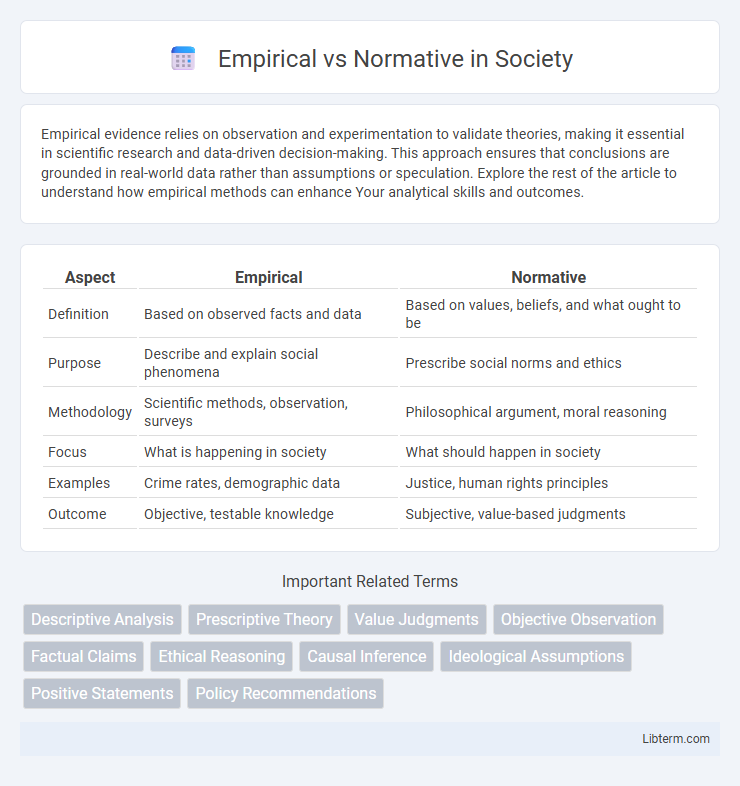Empirical evidence relies on observation and experimentation to validate theories, making it essential in scientific research and data-driven decision-making. This approach ensures that conclusions are grounded in real-world data rather than assumptions or speculation. Explore the rest of the article to understand how empirical methods can enhance Your analytical skills and outcomes.
Table of Comparison
| Aspect | Empirical | Normative |
|---|---|---|
| Definition | Based on observed facts and data | Based on values, beliefs, and what ought to be |
| Purpose | Describe and explain social phenomena | Prescribe social norms and ethics |
| Methodology | Scientific methods, observation, surveys | Philosophical argument, moral reasoning |
| Focus | What is happening in society | What should happen in society |
| Examples | Crime rates, demographic data | Justice, human rights principles |
| Outcome | Objective, testable knowledge | Subjective, value-based judgments |
Introduction to Empirical and Normative Approaches
Empirical approaches rely on observable, measurable evidence gathered through experiments, surveys, or data analysis to understand and describe phenomena. Normative approaches emphasize value-based judgments, prescribing how things ought to be according to ethical, moral, or social standards. Together, these approaches offer complementary perspectives: empirical methods analyze what is, while normative frameworks guide what should be.
Defining Empirical Analysis
Empirical analysis involves the systematic collection and examination of observable data to test hypotheses or answer research questions using statistical methods and experiments. This approach relies on measurable evidence derived from real-world observations, distinguishing it from normative analysis, which focuses on value judgments, ethics, and what ought to be. Empirical research underpins scientific disciplines by providing objective, data-driven insights that inform decision-making and policy development.
Understanding Normative Perspectives
Normative perspectives prioritize values, ethics, and what ought to be, guiding decision-making processes with principles rather than solely relying on observable facts. Understanding normative frameworks involves analyzing moral duties, societal ideals, and cultural norms that shape human behavior and policy development. This approach contrasts with empirical analysis by emphasizing prescriptive judgments and goals that influence governance, law, and ethical standards.
Key Differences Between Empirical and Normative
Empirical knowledge is based on observation, experimentation, and verifiable data, focusing on what is or what can be measured, while normative knowledge centers on values, ethics, and what ought to be done or believed. Empirical statements are descriptive and objective, relying on factual evidence, whereas normative statements are prescriptive and subjective, reflecting opinions and judgments. The key difference lies in empirical's foundation in reality and facts, contrasted with normative's grounding in ideals and moral imperatives.
Examples of Empirical Reasoning
Empirical reasoning relies on observable data and evidence to form conclusions, such as conducting controlled scientific experiments to test hypotheses or using statistical analysis to evaluate the effectiveness of a medical treatment. For instance, a climate scientist measuring temperature changes over decades to assess global warming provides empirical reasoning based on measurable facts. Similarly, economists analyzing market trends through real-world financial data exemplify empirical reasoning by grounding theories in quantifiable observations.
Illustrations of Normative Reasoning
Normative reasoning involves evaluating outcomes based on ethical principles, values, or ideals, such as determining that justice requires equal treatment regardless of consequences. Illustrations include arguing that governments ought to prioritize reducing poverty because it aligns with moral duties, not just economic metrics. This contrasts with empirical reasoning, which focuses solely on observable data and factual analysis without prescribing what should be done.
Importance of Empirical Methods in Research
Empirical methods in research are essential for gathering objective data through observation and experimentation, providing a factual basis for analysis. These methods enable researchers to test hypotheses, validate theories, and generate reliable evidence that supports decision-making across scientific disciplines. The reliance on empirical data ensures that conclusions are grounded in real-world phenomena rather than subjective opinions or normative assumptions.
Role of Normative Analysis in Policy and Ethics
Normative analysis in policy and ethics establishes standards for evaluating what ought to be done, guiding decision-making toward values such as justice, fairness, and equity. It contrasts with empirical analysis, which describes realities based on data and observations without prescribing actions. By incorporating ethical principles, normative analysis shapes policies that align with societal goals and moral obligations.
Common Misconceptions: Empirical vs Normative
Common misconceptions about empirical and normative concepts often confuse descriptive facts with prescriptive values, leading to the false belief that empirical observations can directly determine what ought to be done. Empirical statements are based on observable, verifiable data, measuring what is, while normative statements express judgments about what should be, grounded in ethical, moral, or social principles. This distinction is critical to avoid conflating objective evidence with subjective evaluations in academic, scientific, or policy discussions.
Integrating Empirical and Normative Approaches
Integrating empirical and normative approaches enhances decision-making by combining data-driven evidence with value-based judgments, ensuring that policies are both effective and ethically sound. Empirical research provides measurable insights into real-world outcomes, while normative analysis addresses what ought to be done based on principles and societal goals. This integration supports comprehensive frameworks in fields like public policy, law, and ethics, promoting informed and morally responsible actions.
Empirical Infographic

 libterm.com
libterm.com